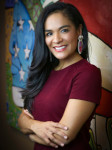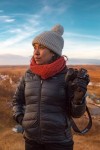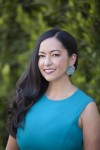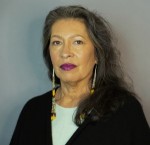IYKYK: The Power of the Native Vote
Session Type(s): Panel
Starts: Thursday, Oct. 7 3:45 PM (Eastern)
Ends: Thursday, Oct. 7 4:45 PM (Eastern)
Leaders from Indian Country will discuss the unique political landscape in Native communities. They’re deeply involved in the fight for climate justice and against the extractive industry’s socio-economic impacts. They will share what they’ve seen since the 2020 election, discuss how Native people are exerting influence at the local, federal, and congressional levels and how voters are preparing for midterm elections.
Moderator
Lycia Maddocks

Lycia Maddocks is a citizen of the Quechan Indian Nation raised in Ft. Yuma California and Yuma, Arizona. Lycia is a skilled relationships and communications strategist who carries years of experience in leading campaigns and movements to advance the political power of Native people, to expand the exercise of sovereignty by tribal nations, and to increase the influence of American Indian and Alaska Native enterprises. Lycia currently directs the political and elections work by analyzing dynamics and curating strategies to advance NDN Collective’s mission. She holds degrees in Indigenous Peoples Law, Communications, and Film and Video Production.
Panelists
Jade Begay

Jade is a multimedia artist, filmmaker, and a digital and communications strategist. Jade’s work explores Indigenous futurism, decolonization, Indigenous representation in the media landscape. Jade has partnered with organizations like Resource Media, United Nations Universal Access Project, 350.org, Indigenous Environmental Network, Sierra Club, Bioneers, Indigenous Climate Action, the Women’s Earth and Climate Action Network, Allied Media Project, and Tribal Nations from the Arctic to the Amazon to develop strategies, digital storytelling campaigns, and original content to mobilize and create more engagement around the most urgent issues of our time. Currently, Jade is the Creative Director at NDN Collective and is developing a VR/AR series in partnership with Google VR and is producing and directing films independently.
Chrissie Castro

Chrissie Castro, Diné and Chicana, is the Chairperson of the Los Angeles City and County Native American Indian Commission, and co-led the change to replace Columbus Day with Indigenous Peoples Day in the City and County of Los Angeles. She co-founded two organizations to build power within Native communities – in her local state, the California Native Vote Project and nationally, Advance Native Political Leadership. She is a leadership and coach trainer for multiracial grassroots leaders in service to healing, justice and liberation.
Michael Johnson
Michael Johnson, Director of Advancement, is a citizen of the Three Affiliated Tribes of North Dakota and a relative of the White Earth Nation where his grandfather is a citizen. He leads NDN Collective’s Advancement work and team. Johnson’s work over the last decade has engaged key stakeholders in Indian Country and beyond to create lasting relationships built on respect, reciprocity, impact, and success. Johnson has a has a Bachelor’s degree in Political Science from the University of Colorado Denver.
Judith LeBlanc

I am a member of the Caddo Tribe of Oklahoma and director of the Native Organizers Alliance (NOA), a national Native training and organizing network. NOA builds relationships with tribes, traditional societies and grassroots community groups in key Native communities and reservations through Native community organizing training and strategic campaign planning.
At the core of my work is the belief that organizing a grassroots, durable ecosystem of Native leaders and organizers who share a common theory of change rooted in traditional values and sacred practices is necessary to achieve tribal sovereignty and racial equity for all.
The path to transformational social change is built upon an ecosystem of relationships or as we say in Indian Country, being “a good relative.” Being a “good relative” is walking in total awareness of the environment, past, and future, and acting, in the present, in harmony with all in the natural world and humanity.
I am a board member of IllumiNative, and chair of the board of NDN. I am currently a Roddenberry Fellow.